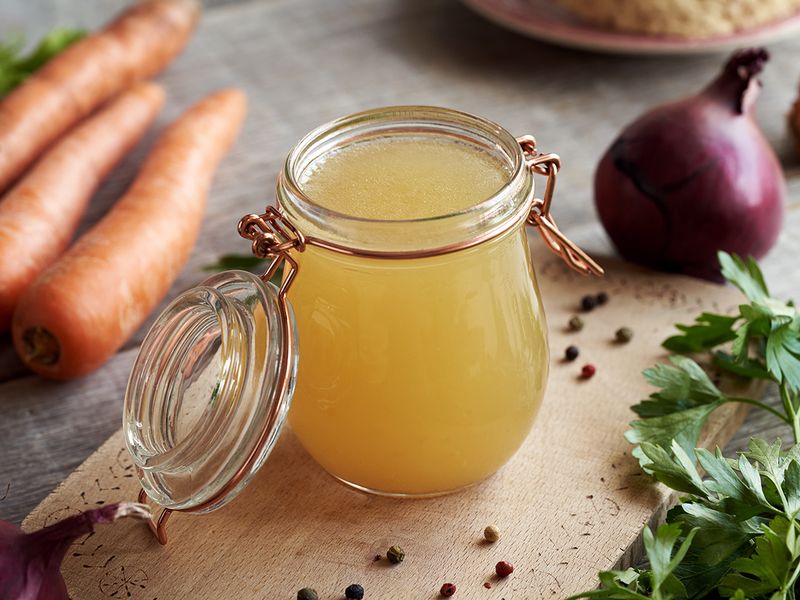
Imagine a steaming bowl of bone broth, simmered to perfection and infused with the rich essence of meaty bones, fresh herbs, and a splash of tangy vinegar — a delicious remedy for your woes, or so TikTok claims. Many users have sworn that it has “changed their lives”, asserting that it can clear the skin and heal the gut lining. One enthusiastic user shares, “I drink it every morning and night, and sometimes as a snack because it’s just that warm and satisfying.”
While there’s some truth to these glowing testimonials, it’s important to consider a few caveats. So before you grab a bowl, let’s uncover what’s really true.
What really is bone broth?

Bone broth is a nutrient-rich liquid made by simmering animal bones and connective tissues — such as those from beef, chicken, or fish — in water for extended periods. This slow cooking process extracts valuable nutrients like collagen, gelatin, amino acids, and minerals, resulting in a broth commonly used for soups and sauces. As Maya Sainani, a Dubai-based physician explains, “It might taste similar to other broths or stocks or even share many of the same ingredients, making it a perfect base for soups and stews. However, what sets it apart is its use of meaty joint bones, the extended simmering time, and the array of health benefits people attribute to it.”
The hours of simmering help extract more protein from the bones and connective tissue than is typically found in other broths and stocks, she says. “It provides several minerals, electrolytes, such as magnesium, calcium, phosphorus, sodium and potassium, which are really beneficial for your health too.”
So, considering that is filled with important nutrients, is it really a cure-all for gut health, joint ailments and inflammation as the claims say?
Can it alleviate joint pain?
It works like magic, according to one TikToker. Another declared it as an brown-gold “elixir that relieves you from joint pains”.
In theory, it does make sense. As Radhika Nair, a clinical dietician based in Abu Dhabi explains, collagen is indeed, a major structural protein in the body, especially in cartilage, which cushions joints. “The idea is that consuming collagen from bone broth can help replenish the body’s collagen stores, supporting joint health and essentially reducing discomfort associated with conditions like osteoarthritis,” she says. Moreover, when this collagen is cooked it turns into gelatin, which contains amino acids like glycine and proline. These amino acids are crucial for building and maintaining cartilage and connective tissues. A few studies have tried to back these claims too: A 2019 study published in The American Journal of Clinical Nutrition investigated the effects of collagen supplementation on athletes, particularly for tendon and ligament health. The study found that taking collagen hydrolysate supplements, combined with a resistance training program, helped improve tendon strength and overall performance in young athletes.
Nair also cites several studies that have explored the effects of collagen hydrolysate on individuals with osteoarthritis, particularly in the knee. A 2012 review published in UK-based academic journal Current Medical Research and Opinion analysed multiple clinical trials and found that collagen hydrolysate could improve joint pain and function in people with osteoarthritis. However, this has not been tested with bone broth itself. In fact, a 2018 study published in The Journal of the International Society of Sports Nutrition revealed that the amino acid levels in home-cooked and store-bought bone broths can vary significantly and are often much lower than those found in collagen supplements.
Can it reduce gut inflammation and leakiness?

A bone broth that washes away all the stomach bugs? Where do we sign up?
Well before we sign up, there are a few things to keep in mind. As both Sainani and Nair explain, bone broth has collagen and gelatin in abundance, which work well for gut health. Gelatin can absorb water and help maintain the mucosal lining of the gastrointestinal tract, potentially preventing or reducing inflammation. The broth also contains amino acids, particularly glutamine, which is believed to play a role in maintaining gut integrity. Nair adds, “Glutamine is a vital nutrient for the cells of the intestines, and some research does suggest that it can help repair the intestinal barrier, reducing permeability and inflammation. It could be helpful for individuals with gastrointestinal disorders.”
However, while anecdotal evidence does support the idea that a warm bone broth can soothe the gut and reduce inflammation, scientific research specifically linking bone broth to decreased gut inflammation is limited. Some studies suggest that the amino acids and nutrients in bone broth may help support overall gut health, but more rigorous clinical research is needed to establish a direct connection, as many of these studies are conducted on mice. For instance, in one study published in 2021 on the US-based National Library of Medicine, researchers reported that when a small number of mice drank bone broth for 10 days, they were less susceptible to intestinal damage and inflammation than those that drank water. However, it’s not yet certain whether bone broth could have a similar effect on people.
So, the specialists do admit that while drinking a bowl of hot broth might feel comforting and soothing, it might not be a miraculous cure-all that you believe it is.
Is it perfect for my skin?

Owing to the presence of collagen, it’s believed that bone broth can be the miracle to all your skin woes. Truth be told, collagen is a structural protein, essential for maintaining skin elasticity and hydration. “As we age, natural collagen production decreases, which leads to sagging skin,” explains Sainani. So, consuming collagen-rich foods like bone broth might just support skin structure and reduce the appearance of aging.
Nair adds, “It is also hydrating and does contribute to overall skin health. You need proper hydration as that helps preventing dryness, which can exacerbate the appearance of fine lines and wrinkles.”
While there is still growing evidence on collagen supplements that may benefit skin health, the research is still in the preliminary stages, explains Amir Ali, a Dubai-based dermatologist specialist. “More importantly, there aren’t studies on bone broth’s effect on our skin, so it really cannot be said for certain,” he adds.
Should you drink bone broth everyday?
Well, like with everything else, consume it in moderation, warn the specialists. Remember, store-bought bone broths can be high in sodium, so it’s best you read the labels carefully and possibly try make your own with less salt.
Ali says, “No doubt, it’s comforting, warm and light on your stomach, too. You’ll feel nourished and hydrated, even when you’re ill. However, don’t consume it like a magic potion, believing that it will solve all problems as TikTok says.”











